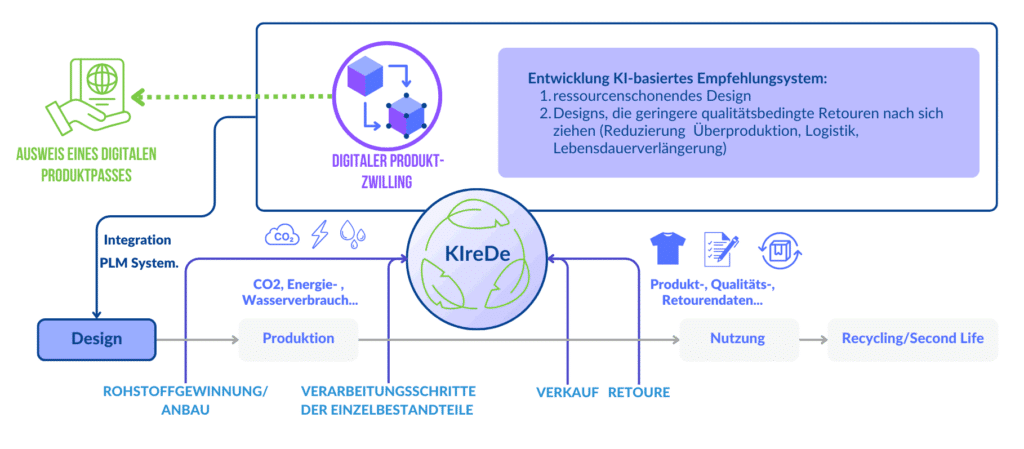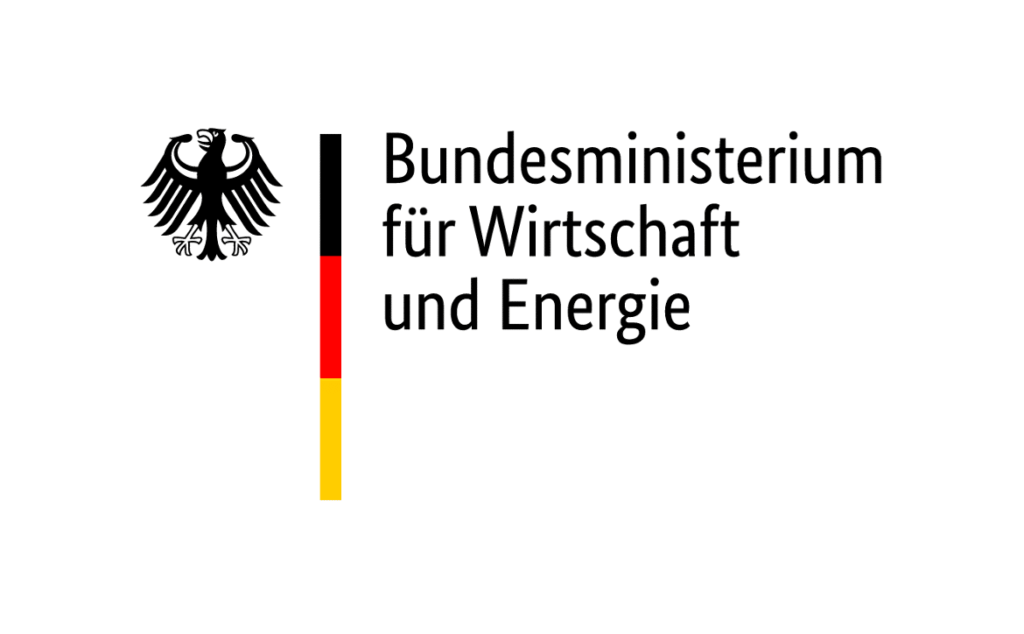KIreDe
Development of an AI-based IT system to promote resource efficiency and sustainability along the entire value chain of the textile and clothing industry.
The KIreDe project aims to develop an AI-based IT system that makes sustainability transparent and optimizes it along the entire textile value chain. By combining a digital twin with a digital product passport, comprehensive data on energy consumption, CO₂ emissions, water consumption and recyclability are collected and analyzed at the article level.
The system enables companies to make resource-saving and quality-enhancing decisions right from the design and development phase. Machine learning algorithms can be used to identify optimal material and component combinations in order to achieve sustainability goals, minimize waste and maximize recyclability.
In addition, the project creates the basis for transparent communication with end customers and meets the requirements of current and future legal requirements such as the Supply Chain Due Diligence Act (LkSG) and the EU requirements for digital product passports. KIreDe thus supports a more sustainable and circular textile industry that combines ecological and economic goals.
Our role in the project
As part of the project, the institute is responsible for developing the components of the digital twin and the AI-based assistance system.
work package 1
Goal: Definition of the requirements and architecture of the overall system
Tasks of the institute:
- Participation in the requirements analysis for the overall system development from a user and technical perspective
- Support in aggregating data from different sources
- Preparation, structuring and linking of data in preparation for integration into the digital twin
Total result: Requirements documentation for the architecture, the individual system components and the overall system from a user and technical perspective; creation of the data basis and preparation of this for integration into the digital twin
work package 2
Goal: Research and definition of relevant sustainability criteria in the textile and clothing industry
with associated influencing factors that are reflected in the data
Tasks of the institute:
- Conducting research on current and future legislative requirements at national and international level
- Participation in the definition and representation of relevant sustainability criteria in the textile and clothing industry
- Development of the relationships and influences along the value chain on the sustainability balance of textile products
- Development of a Sustainability Map in collaboration with other partners
Total result: Comprehensive sustainability map of the textile and clothing industry with a focus on the value chain of products.
work package 3
Goal: Identification and development of metrics with which the sustainability criteria and influencing factors can be quantifiably measured and mapped onto data
Tasks of the institute:
- Participation in the validation of scales and sustainability criteria through test data
- Development of mathematical functions to map sustainability criteria
- Definition and comparison of the necessary data sets for the correct representation of factors
overall goal: Metrics for mapping sustainability and risk factors based on the relevant properties and data of the value chain of a textile and clothing product
work package 4
Goal: Development of the digital twin to map fashion products across the entire value chain based on the requirements and product, quality, returns and sustainability data.
Tasks of the institute:
- Development of the database structure and modeling of the digital twin.
- Integration of the metrics developed in WP3 into the value chain.
- System-side implementation and linking of the data with the digital twin.
- Definition of requirements and development of functionalities for a digital product passport.
overall goal: Digital twin to map the value chain of a product with all relevant sustainability and risk factors.
work package 5
Goal: Development of the system component for determining sustainability values at item level through the results obtained in WP2 and WP3 and for predicting sustainability, quality and cost values during the design and production process.
Tasks of the institute:
- Intensive literature research to select suitable machine learning methods in the textile and clothing industry, taking into account the state of the art in research and practice
- Annotation and training of artificial intelligence models to determine sustainability and cost factors at item level based on the underlying data in the digital twin for existing items as well as for prediction during the design and production process
- Development of recommendations for action for the design and production process using AI components with other partners
- Adaptation and integration of methods from PreQA to predict product quality
Total result: AI system for predicting sustainability, cost and quality factors of an existing or under development textile and clothing product.
work package 6
Goal: Integration of the developed components into the PDM/PLM/ERP system, supporting users throughout the entire value creation process with recommendations based on AI insights.
Tasks of the institute:
- Participation in the development of the overall system architecture and integration of the software components
- Support in integrating the digital twin and AI components into the overall system
- Participation in the development of interfaces between the components and the ERP system
- Development of a user-friendly dashboard to control the system
Total result: Connected overall system with all developed software components as a software prototype
The initial situation
Overview of the need for action
The textile and clothing industry produces 1,2 billion tons of CO₂ annually, which accounts for 5% of global emissions - more than international air and cruise ship traffic combined. Despite increasing consumer awareness of sustainability and its influence on purchasing decisions (75% according to a BCG survey), there is still considerable need for action to achieve the goals of the Paris Climate Agreement and the United Nations. In particular, the lack of transparency and fragmentation of global supply chains make the transformation to a sustainable, circular economy difficult.
1,2 billion tons of CO₂ from the textile and clothing industry
growing awareness of sustainability
Your contact person
KIreDE
AI-based assistance system for resource-efficient and sustainable design processes in the textile and clothing industry
Laura Bies
laura.bies@aws-institut.de
+49 162 2934 499
Your contact person
KIreDE
AI-based assistance system for resource-efficient and sustainable design processes in the textile and clothing industry
Laura Bies
laura.bies@aws-institut.de
+49 162 2934 499
Our solution approach in focus
The goal of the KIreDe project is achieved through a combination of several innovative approaches:
- Digital twin: This shows all relevant data about a piece of clothing – from sustainability factors (e.g. CO₂ emissions, water consumption, recyclability) to quality data. This database enables transparency and serves as a basis for decisions.
- AI-based assistance system: The system analyzes the data of the digital twin and provides recommendations for action. It helps designers and manufacturers to select resource-saving materials, sustainable suppliers and optimal material combinations.
- Integration into existing systems: The IT system can be seamlessly integrated into existing PLM, ERP and PDM systems to ensure smooth use along the entire value chain.
- Data-based optimization: Historical quality and returns data are analyzed to prevent future quality problems in the design process, extend product life and reduce returns.
- Digital Product Passport : Sustainability information on products is made transparent to end customers in order to encourage conscious purchasing decisions and give companies a competitive advantage.
These measures enable the development of more resource-efficient and higher-quality products that combine ecological and economic objectives.

Funding notice
The KIreDe project is funded by the Federal Ministry for Economic Affairs and Energy.
Funding code: 03EI5024B
Running time: 01.01.2025-31.12.2027

